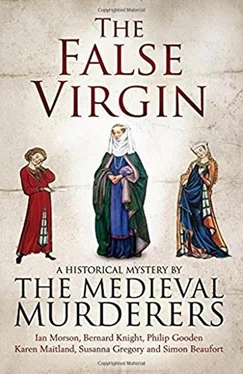‘How did the manuscript come into your hands, Richard?’
‘It has been lying here all this time, in the Bermondsey library. It is the belief of Brother Peter that the manuscript was deposited in our library more than a hundred years ago by another prior, also called Richard.’
Geoffrey remembered Brother Peter from his earlier visit, an elderly, stringy man who peered through his spectacles at one’s face as if he were reading a book. He was glad to hear the librarian was still alive.
They were interrupted by the arrival of supper, brought in by two lay brothers. With reluctance Geoffrey and Richard shifted from their places by the fire. The prior replaced the manuscript on his desk and the two men moved to a table near a window, from which there was a view of the conventual church, a great shadow looming over the cloisters in the dusk. Candles were lit, food was served, fresh wine poured, and the lay brothers withdrew as wordlessly as they had come.
At first they ate in silence. Geoffrey was right. Fish of this quality – turbot and sole – would not be served up in the refectory. Nor would the open pie of cheese and the custard dishes that followed. Enjoying the food and wine, Chaucer was happy to wait and see where the Prior of Bermondsey would lead the conversation. He didn’t think it was a coincidence that Richard Dunton happened to have on his desk the manuscript with the Beornwyn story while he was welcoming a new guest. And the prior had not recited that same story with real feeling just to show off his oratorical skill.
The prior complimented Chaucer on the lucrative post to which he had recently been appointed: controller of the taxes paid on both the wool and the wine passing through the port of London. Since it was John of Gaunt who was responsible for the double appointment, Chaucer played down his own merits and said something about the Duke of Lancaster’s generosity. The prior’s reply was that John of Gaunt had good reason to be grateful to Geoffrey. Chaucer thought they were getting close to dangerous territory again but it turned out that Richard Dunton was referring not to any secret understanding between Chaucer’s sister-in-law and Gaunt, but to a poem that he had composed a few years earlier in memory of Gaunt’s first wife, Blanche. The poem was called The Book of the Duchess . Copies of it were circulated in court, where it was also recited, and Geoffrey knew that the grieving John was consoled by the praise that he bestowed on ‘my Lady White’. Now, the Prior of Bermondsey claimed that he too had been moved by this elegy to a noble woman. As he mentioned this, his glance shifted towards the Beornwyn manuscript lying on his desk.
‘So you think I might do the same for the virgin saint?’ said Geoffrey, understanding the direction of the talk. ‘Do you believe that Beornwyn deserves a memorial in verse, Richard?’
‘Far be it from me to dictate what you should write,’ said Dunton, leaning back in his chair, replete with food and drink, dabbing with a napkin at a spot of grease on his upper lip. ‘I am merely offering it to you… so you might read the story at your leisure.’
‘Then I’ll look at it,’ said Geoffrey. ‘Thank you.’
Although Chaucer took the thing out of courtesy, he had no intention of reading it through. The more the prior pushed the subject at him, the more he resisted. He’d glance at the manuscript before handing it back together with some appropriate comment. He suspected that Richard was pressing the Beornwyn story on him because, if Chaucer were to turn it into verse and circulate copies among the noble ladies and gentlemen of the Savoy Palace, then the whole business would reflect well on Bermondsey Priory and on Dunton himself. Cynical to think so, perhaps, but Geoffrey couldn’t blame him for trying.
While the prior went off to compline, Chaucer returned to the guest-chamber that had been prepared for him. He was conducted there by a lay brother. The chamber was furnished with a bed, a large chest, a stool and a small table set under a window, which was shuttered. Geoffrey was half amused, half irritated to see that on the table top was an array of quill pens, pots of ink and sheets of paper. Not only was the prior determined he should compose a story (about St Beornwyn) but he was even providing the tools for the job, even if he had not gone to the expense of providing proper parchment to write on.
Apart from the writing gear, the simple furnishings of the room were very different from the comforts of the Savoy Palace or Chaucer’s own accommodation at Aldgate. But he liked it in this place. Being on the far side of the river turned London almost into a foreign country. His life in the city itself was his public life. Yet, while Geoffrey’s official positions at the port of London were lucrative, as the prior stated, they were not very onerous. In the meantime his wife was attached to the Duke of Lancaster’s court and therefore better provided for than anything he could arrange for her. Philippa kept the children, Elizabeth and Thomas, with her too. He was happy to see them – and their mother – now and then. Geoffrey found himself with time on his hands. Time to write. The priory was a place where he was able to write. No doubt it was as riven with jealousy and pettiness as any place on God’s earth must be, but nevertheless the atmosphere of labour and outward piety at Bermondsey was for Geoffrey Chaucer a spur to composition.
The bed in his room was well enough equipped to have a candle fixed to a bracket, which extended from the frame. Visitors were evidently expected to read and study. Once the lay brother departed, Geoffrey stretched out on the bed, intending merely to cast his eye over the tale of St Beornwyn before settling himself to sleep. But half an hour later he was still reading, although now with much greater alertness. He couldn’t have said exactly why. The story of Beornwyn was related in a dialect with which he wasn’t completely familiar, and therefore not always to be understood straightaway. And, as he’d said half humorously to the prior, the unusual features of this life were actually quite normal, for a saint. So what gripped him? Was it the setting on the rocky coast in the north country? The butterfly veil? The image of a woman, alone and assailed by attackers rising up from the sea? Some combination of these perhaps. Almost against his wishes, he found himself becoming interested in this Beornwyn.
Eventually he put down the manuscript and lay back with his hands cradling his head. He no longer felt tired but fresh and lively, in mind at least. What could he do with St Beornwyn now? Was she really as she had been written up in this story? The virgin who rejects an arranged marriage, the pure woman who keeps company with the angels. Geoffrey thought of his sister-in-law, Katherine Swynford, another woman with a name for piety. Katherine was a young widow. She was also the lover of John of Gaunt, the third son of King Edward but in point of importance the second man in the kingdom. Given the King’s decrepit state, some would say he was first in the land. When a respectable interval had elapsed after the death of his wife, Blanche, whom he had sincerely loved, John married Constance, the daughter of an ousted (and now dead) king of Castile. By so doing, John had been anointed King of Castile, even if a rival claimant was inconveniently in possession of the throne. Though Constance was a beautiful and highly eligible bride, this was a marriage of power and expediency. Geoffrey Chaucer didn’t think that John of Gaunt’s heart was in the union, whatever his head and his father – Edward III – dictated. No, John’s heart and his other parts rested with Katherine.
Chaucer wasn’t certain when Katherine and John had become lovers but it must have been at least four years previously because there was a child of their union, a boy now rising three. He could ask Philippa, of course, but his wife might not tell him, even assuming she was intimate with all of her sister’s secrets. But whenever it was that John and Katherine began their liaison, both were widowed at the time. Now Gaunt had a queen and a mistress, the two often living under the same roof. Fortunately, the roof of the Savoy Palace was very extensive. To the outside world, Katherine had a reputation as a pious lady (the true parentage of the child was known to very few). Yet while Katherine was genuinely devout, as Geoffrey was aware, she also had a hidden passion for John of Gaunt.
Читать дальше












